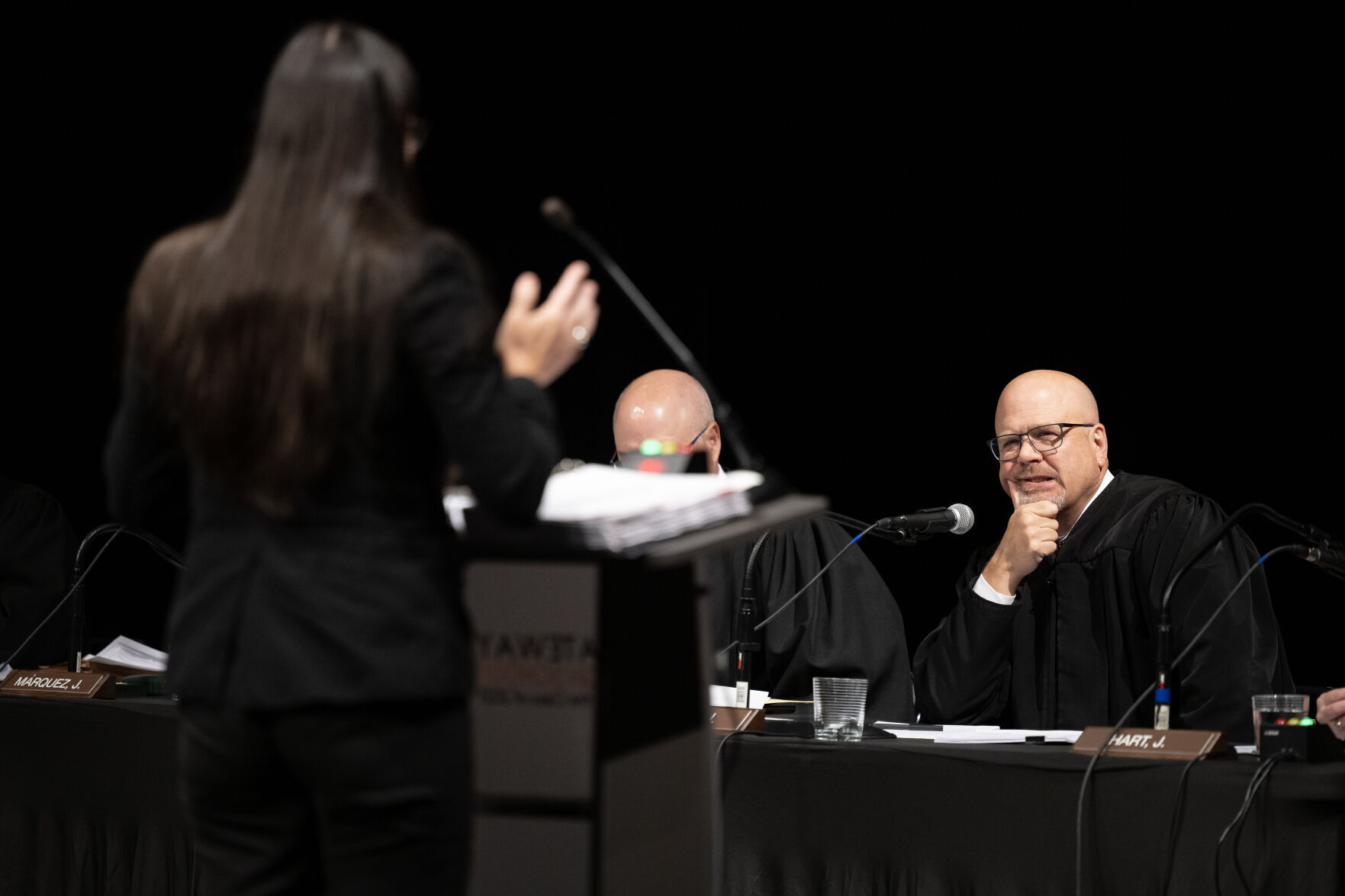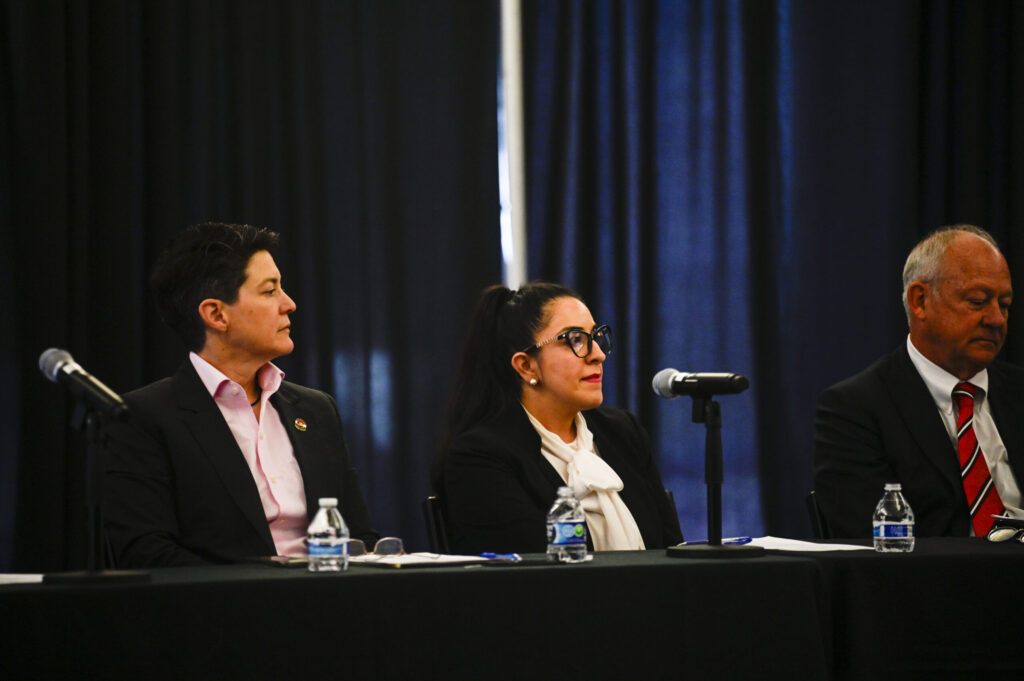Colorado justices ponder parole requirements for juvenile sex offenders amid constitutional challenge

Colorado’s justices on Tuesday appeared to believe the state law authorizing lengthy sentences for adult sex offenders does, when applied to juveniles, account for the guardrails necessary to comply with the U.S. Constitution.
However, that determination would only be a piece of the larger puzzle, due to the unusual manner in which the case of Omar Ricardo Godinez arrived at the Colorado Supreme Court.
Godinez, who was involved in the kidnapping and rape of two victims when he was 15, was charged as an adult in Arapahoe County and sentenced to 32 years to life upon his conviction. Therefore, Godinez fell under the Sex Offender Lifetime Supervision Act (SOLSA), a 1998 law generally requiring indefinite sentences in prison for felony sex offenses.
Godinez is challenging his sentence in federal court, arguing SOLSA does not require parole officials to evaluate his maturity and rehabilitation when deciding whether to grant his release. Because the U.S. Supreme Court has recognized the Eighth Amendment’s prohibition on cruel and unusual punishment must account for those factors when a juvenile is involved, Godinez alleges his SOLSA sentence amounts to a constitutional violation.
Rather than address the question directly, the Denver-based U.S. Court of Appeals for the 10th Circuit transmitted the case to the state Supreme Court last year. While the 10th Circuit did not ask Colorado’s justices to decide the ultimate constitutional issue, the federal court was curious whether SOLSA requires, prohibits or simply permits parole officials to consider juvenile sex offenders’ maturity and rehabilitation.
During oral arguments, members of the Supreme Court seemed to lean toward “permits.” However, even that middle ground could still amount to a constitutional violation.
“Let’s say we said ‘permits,'” observed Justice Carlos A. Samour Jr. “Could a parole board be free to not consider maturity?”
“Generally speaking,” responded First Assistant Attorney General John T. Lee, “in what world would the parole board release someone back into society without a determination of whether they’ve matured and been rehabilitated?”

In 2010, the U.S. Supreme Court decided Graham v. Florida, announcing that juveniles could not be sentenced to life in prison for non-homicide offenses without a “meaningful opportunity” for release. That opportunity must be based on a defendant’s maturity and rehabilitation, the court clarified.
SOLSA charges parole officials in Colorado with considering a person’s suitability for parole based on their progress in treatment, their threat to the community and their likelihood of reoffending. However, the law does not mention maturity or rehabilitation.
The 10th Circuit, in evaluating Godinez’s challenge to his sentence, suggested “rehabilitation” might fall under one or more of the criteria already listed in SOLSA.
But “where’s the maturity aspect in SOLSA?” asked Judge Carolyn B. McHugh during oral arguments. “Which means, when they committed the crime they weren’t fully formed in the frontal lobe. Where do you see that?”
Some members of the state Supreme Court, when it was their turn to evaluate the case, wondered the same thing.
“You seem to treat both the word ‘rehabilitation’ and ‘maturity’ as just reflecting growth,” said Justice William W. Hood III to the government. “And I suppose they both do, in a sense. But if rehabilitation means growth and rehabilitation encompasses something that’s more subject to metrics, then surely maturity has to mean something else.”

Jonathan D. Reppucci, the attorney representing Godinez, acknowledged the existing parole criteria could account for a juvenile defendant’s rehabilitation. But whether SOLSA directly or indirectly prompts parole boards to consider maturity, “I think the clear answer is it does not.”
“How do they not consider maturity when it comes to a juvenile?” asked Chief Justice Brian D. Boatright. “I mean, I can’t imagine a conversation around whether we’re gonna grant a juvenile parole under SOLSA without saying, ‘He’s grown up. He’s not impulsive anymore. He’s not 15. He’s not easily led astray.'”
On the other hand, countered Justice Melissa Hart, “it concerns me that we would say a statute requires something that isn’t listed in the statute.”
Ultimately, Reppucci argued it would be logical, and even necessary, for courts to find SOLSA unconstitutional as applied to juveniles because elected officials would never act to bring the law into compliance with the U.S. Supreme Court’s mandate.
“Doing anything that could be seen as lenient towards sex offenders is political poison,” he said. “That’s why this hasn’t gotten done by the legislature.”
Samour brushed aside that notion.
“That’s not a consideration in constitutional analysis,” he said.
Although Godinez’s case has implications for a small group of defendants – juveniles tried as adults for sex offenses – SOLSA is the target of multiple constitutional challenges elsewhere. Adult defendants are arguing the state’s inability to provide sex offender treatment in time for their parole eligibility dates is a violation of their constitutional rights.
Two federal judges in Colorado recently signaled their support for that theory in a pair of ongoing lawsuits.
The case is Godinez v. Williams et al.













